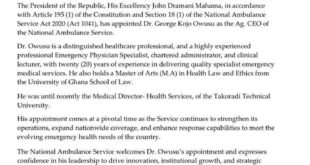The Minister of Finance, Mr Ken Ofori-Atta, will today lay before Parliament, the 2021 mid-year budget review for its consideration and adoption.
The budget review, which is in accordance with Article 179 of the 1992 Constitution and the Public Financial Management Act 921, will give the fiscal authority an opportunity to revise macroeconomic targets and present a comprehensive economic outlook for the rest of the year based on inflows and outflows within the last six months of the year.
Coming on the back of a revenue shortfall in the last five months of the year as announced by the Monetary Policy Committee of the Bank of Ghana last Monday, the Daily Graphic has hints that the Finance Minister will use the supplementary budget to announce additional measures to shore up revenue mobilisation to be able to meet the end year revenue target.
The Daily Graphic has also picked information that the Finance Minister would give some updates about the Ghana CARES Obaatampa programme which is meant to be a major driver of the government’s industrialisation programme.
In the area of expenditure, the Finance Minister is expected to announce measures that will keep the levels within projected target to avoid widening the deficit which has been a worry to all including the Breton Wood institutions and economic watchers.
Revenue
On the revenue side, the total revenue and grants amounted to GH¢22.6 billion (5.2 per cent of Gross Domestic Product (GDP) in the first five months of the year, compared to the same period in 2020 when it was GH¢20.26 billion, equivalent to five per cent of GDP.
The bank said the outturn for the first five months of the year was below the projected amount of GH¢26 billion, equivalent to six per cent of GDP.
The government is aiming to collect GH¢72.5 billion in total revenue and grants, equivalent to 17.6 per cent of GDP, this year.
Mr Ofori-Atta, the Daily Graphic has gathered, will leverage the synchronisation of the Tax Identification Numbers (TINs), Social Security numbers and the National Identification numbers which has increased the eligible number of tax payers from about six million to over 14 million to widen the tax net.
There will, however, be no additional taxes or levies imposed our sources say except to encourage compliance among those eligible to pay tax.

Economic analyst
Meanwhile, ahead of the presentation, an economist, Dr Said Boakye, has called for urgent steps to reduce inefficiencies in the public sector to help speed up the revival of private businesses and the economy in general.
He mentioned high interest rates on government securities, increased borrowing and lack of spending on productive and growth-enhancing sectors as some of the bottlenecks undermining the speedy turnaround of businesses and the economy in general.
In an interview with the Daily Graphic yesterday, Dr Boakye referred to data released by the Bank of Ghana (BoG) this week which showed that although the private sector had been resilient, with enterprises making strong comebacks from COVID-19 bruises, inefficiencies in the public sector continued to slow down the pace of the rebound.
Consequently, the economist, who is also the Director of Research at the fiscal policy think tank, the Institute for Fiscal Studies (IFS), said today’s mid-year budget review must aim at addressing those challenges to help unleash the full potential of the private sector.
“The government will have to improve on its finances; it has to increase revenue mobilisation and spend prudently to spur growth in the private sector. It has to be realistic on what it can do and cannot do and stick to it to help build confidence,” he said.

Expectations
Dr Boakye indicated that he did not expect the government to introduce new revenue measures but rather, announce steps to help boost collections.
The economist pointed out that the Ghana Revenue Authority (GRA) needed to be strengthened to plug the leakages in the system to help spur collections.
He said he expected the government to reduce its expenditure to help contain the slowdown in revenue growth.
Dr Boakye cited capital expenditure and the goods and services budget as the two items that could be affected in the event of a cut.

Low credit to businesses
The economist and researcher said the BoG data showed that the public sector was burdening the private sector, thereby slowing down the recovery drive.
Throwing more light on his position, Dr Boakye explained that the high debt stock and generous rates on government papers had caused financial institutions and investors to invest more in risk-free treasury securities, resulting in low credit disbursements to private businesses.
That, he said, starved enterprises of credit necessary for reinvestment and expansion to boost their operations and spur economic recovery.
His position came on the back of similar concerns by the BoG that the growth rebound, which began in the last quarter of 2020, had continued into the first half of 2021.
“However, the BoG is concerned about the continued sluggishness in new lending by banks, which could undermine the growth momentum. This slow growth in lending reflects increased credit risks on account of uncertainties in the business environment due to the impact of the COVID-19 pandemic on the real sector, coupled with very high yields offered on government securities due to increased government borrowing.
“This crowding-out effect continues to keep the credit-to-GDP gap below the long-term trend and is likely to delay recovery of the economy and discourage banks from strengthening their credit underwriting processes to manage credit risks from lending to under-served sectors of the economy,” the bank said.
Source: graphic.com.g
Disclaimer: MyGhanaMedia is not responsible for this report and its content.There are four types of content published on MyGhanaMedia daily: curated content; syndicated content; user-generated content; and original content.
Send your news stories to myghanamedia@gmail.com and Chat with us via WhatsApp on +233200818719
 MYGHANAMEDIA.COM Best Source Of Latest News
MYGHANAMEDIA.COM Best Source Of Latest News




